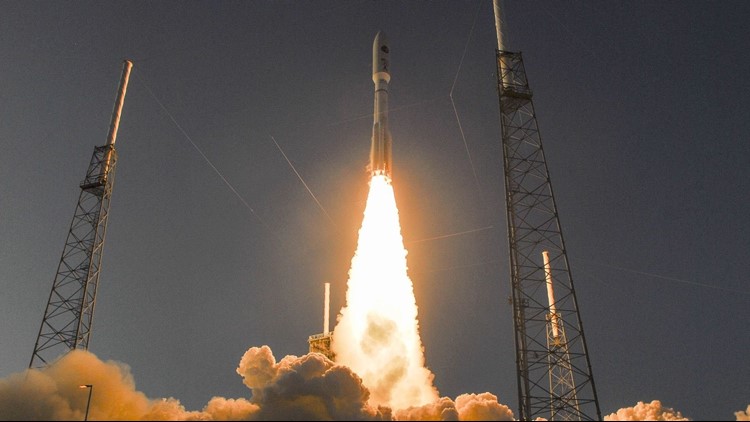CAPE CANAVERAL, Fla. -- United Launch Alliance’s most powerful Atlas V rocket thundered from Cape Canaveral Air Force Station near sunset Saturday with an unusual Air Force mission headed high over the equator.
Firing a main engine and five solid rocket boosters producing more than 2.5 million pounds of thrust, the 20-story rocket shot from Launch Complex 41 at 7:13 p.m.
If all went well, the mission would conclude nearly seven hours later with a communications satellite and an experimental spacecraft dropped directly into orbits more than 22,000 miles up.
Military space experts had never heard of the primary satellite called Continuous Broadcast Augmenting Satcom, or CBAS, until it was revealed about a week ago.
“It is not entirely clear what this satellite is supposed to do other than be a broadcast system of some sort,” said Todd Harrison, director of the Aerospace Security Project and senior fellow at the Center for Strategic and International Studies.
The Air Force said the satellite would “provide communications relay capabilities to support our senior leaders and combatant commanders.”
An innovative secondary mission called Eagle aimed to deploy an adapter ring from the rocket as a standalone spacecraft carrying five technology demonstrations. They included systems seeking to harden satellites against attack, perform self-inspections and improve views of objects flying in that high, geosynchronous orbit.
“That all seems to be in line with the focus you see from Air Force Space Command on where they want to go with resilient, defendable satellite architectures in the future,” said Brian Weeden, director of program planning at the Secure World Foundation.
Saturday’s launch was the first of two scheduled within three days from Cape Canaveral. A SpaceX Falcon 9 rocket is targeting a 6:32 p.m. Monday launch of NASA’s planet-hunting Transiting Exoplanet Survey Satellite mission, or TESS.



